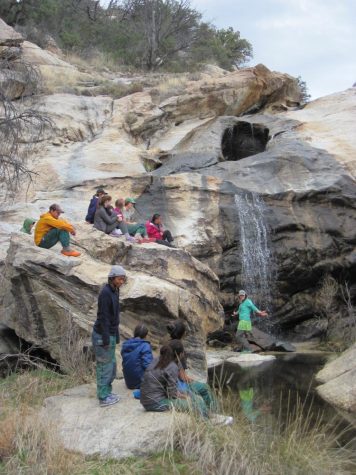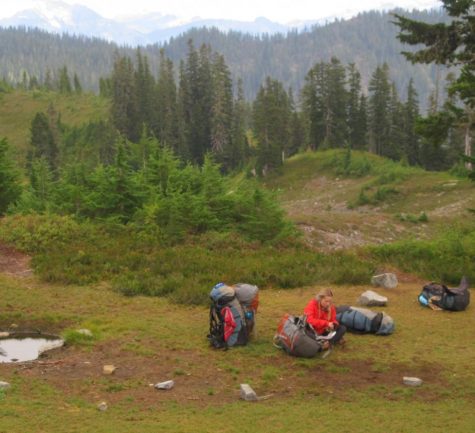Op-Ed: Government budget cuts threaten preservation of federal land, diversity of species
Photo credit: Cybele Zhang
Juniors hike through Mount Baker-Snoqualmie National Forest on Arrow Week. National forests like this support large, diverse ecosystems and create clean air and water needed by humans.
Last month, Donald Trump received his first paycheck as President of the United States. Rather than collecting the $78,333 first installment of his salary, Trump pledged to donate the sum — the recipient, The National Park Service. But the action seems contradictory.
Simultaneously, Trump is proposing budget cuts that would decrease the Department of the Interior’s funding by $1.5 billion and will eliminate some environmental programs altogether, including the National Wildlife Refuge Fund and the nation’s 49 National Heritage Areas: two key agencies and lands that are integral to maintaining diverse species and ecosystems across the nation.
Trump’s plan will also open federal land for oil drilling, logging, gas and mining, which will be incredibly harmful to the environment.
One of proposed drilling sites is Bears Ears National Monument, a 2,000 square mile scenic Heritage Area in Utah. The region is sacred to native tribes, but also rich is natural resources for oil and gas development. It is currently designated as federal land, but Trump’s reforms will deregulate the zone and open it to harmful commerce and industrialization.
Closer to home, Trump’s cuts would also threaten the future of National Parks and National Forests — lands which every Archer girl has the chance to visit during Arrow Week. The park service is already hundreds of millions of dollars behind in deferred maintenance, and Trump’s cuts would only further threaten the future of these integral lands.
The National Park Service was established by Congress in 1916 and instructed the agency to leave park scenery and wildlife “unimpaired for the enjoyment of future generations.” However parks will be unable to carry out this mission without substantial federal funding.

My NOLS hiking group on ninth grade Arrow Week enjoys a scenic waterfall at Saguaro National Park in Arizona. Trump’s budget cuts threaten the future of clean water and air on federal land.
According to Mark Lebetkin from USA Today, federal lands provide the “last true wilderness” in the United States. These protected areas limit industrial development and provide clean air and water to benefit the entire nation. Efforts to maintain these regions are bipartisan because cutting funding and deregulating land will cause catastrophic environmental repercussions for all.
According to Evan Lehmann in an article for Scientific American, Trump also proposes 31 percent budget cuts on the Environmental Protection Agency [EPA], an organization needed to enforce laws like the Clean Water Act and Clean Air Act which regulate the nation’s water and air. The proposed budgets will make it virtually impossible to protect and restore air and water pollution within National Parks, as the National Parks Conservation Association notes.
Trump continuously advocates for the economic benefits of his proposed cuts, but in reality, it may do more harm than good. By cutting funding, these already understaffed federal agencies will be forced to dismiss even more employees, most of whom live in rural communities where few comparable jobs are available.
Another integral job of the National Park Service that will be threatened is conservation and research. According to Yale University, there are currently around 4,000 experiments underway at parks across the nation, all of which may be halted if Trump’s cuts come to fruition.
One of many important conservation efforts conducted by the Park Service is the the peregrine falcon recovery effort here in California. During the ’40s and ’60s, peregrine falcon populations plummeted due to the use of harmful agricultural chemicals.
According to the National Park Service, the species was officially listed as endangered in 1970, but by that time the falcons’ eastern population was already extinct and the western population had declined by 90 percent. Peregrine falcons are keystone species, so many other lifeforms depend on them, causing catastrophic repercussions across the board.
However, with an aggressive recovery program led by California National Parks, which began in 1974, biologists have been able to repopulated much if the U.S., Canada, and Mexico. In August 1999, the U.S. Fish and Wildlife Service removed the peregrine falcon from the list of endangered and threatened species, but efforts by National Parks — namely Yosemite and Channel Islands — continue to ensure the species will flourish.

Esther Dafoe ’18 enjoys a snack in a National Forest in Washington. If Trump’s cuts pass, regions like this may be used for harmful large scale logging.
Trump’s proposed cuts threaten the future of conservation and research initiatives like this. If another species begins to decline, the park service will not have the means to repopulate the animals like they did with the falcons. This results in the loss of biological diversity, which can throw off the balance of entire ecosystems.
Since the Antiquities Act was passed in 1906 no president has deregulated federal land, according to Daniel de Vries. If anything, presidents have done the opposite and added to the regions protected and funded by the U.S. If Trump’s proposed budget cuts are passed, it would create a harmful precedent and could destroy the ecological future of this nation and the planet.
In order to prevent these atrocities it is necessary that citizens take immediate action. Stop Trump’s budget cuts from passing and write to your local congressman to express your views on the topic. You can find your local representative and his/her information here.
Additionally support local National Parks and Forest Lands through visitation. These entrance fees are integral in ensuring the perpetuation of many programs provided.
Federal land is the last true wilderness in our country and is integral to maintaining life as we know it. Without federal protection, these lands would be open to dangerous, unregulated industry and mining and will leave many federal workers unemployed. Cuts will threaten the future of diverse, unique species that call these lands home and will disrupt the natural stability of ecosystems. If changes were to be made, it should not be defunding these integral agencies, but rather increasing funding and expanding federal reach in order to sustain animal, plant and human life for posterity.

Cybele Zhang joined the Oracle writing staff in 2015. She was promoted to Sports Editor as a sophomore and to Editor-in-Chief as a senior. Cybele graduated...











Vivian Shay • May 19, 2017 at 11:44 pm
Great article, Cybele!
I learned that the former director of the Environmental Protection Agency Mustafa Ali resigned under Trump’s administration, and the new director Scott Pruitt also has plans for cutting the EPA’s budget by 75%. I wrote an advocacy letter to him explaining my concerns as well as my ideas, and I’m so glad you’re encouraging our peers to write to our representatives as well.
Vivian
Cybele Zhang • May 20, 2017 at 11:10 pm
Thanks for reading the article! Great to hear that you wrote a letter!